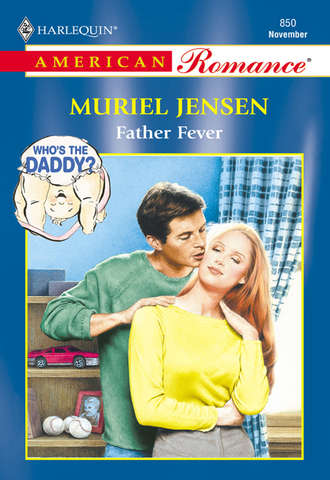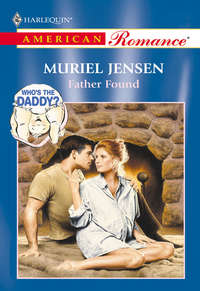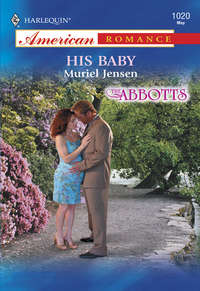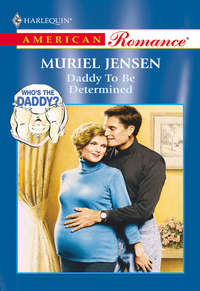
Полная версия
Father Fever
They exchanged grim glances. Trevyn and Bram had worked with Aunty, also.
Trevyn sighed and looked around the room. “She was so no-nonsense on the job,” he said with a reminiscent smile. “It’s weird to think that she had this beautiful home and willingly left it for…what? We were looking for excitement, but what is a sixty-year-old woman looking for?”
“Some kind of fulfillment, maybe,” Bram guessed. “You could tell by the way she worked she wasn’t the kind of woman who did nothing but golf.”
They were all quiet another moment, then he put a chair in place and asked briskly, “There’s no Elk’s hall or armory or anything in town where they could have had this affair? They had to have it here because that’s the way they’ve always done it?”
David shook his head. “Invitations had already gone out. Many to out-of-town people who are summer residents of Dancer’s Beach. Calling to change locations would have been too complicated. So the mayor stopped by while the two of you were still driving the U-haul in from Chicago and asked me if I’d consider saving their hides. Since all three of us will be doing business in this town in one way or another, it seemed like the sporting thing to do.”
Trevyn unfolded the last chair. “What do you know about these historical society types?”
David stood back to survey their work. “Not much, except that I imagine they’ll be Mrs. Beasley’s vintage—middle sixties—so don’t get your hopes up for a lap full of beautiful young things. But they might prove to be potential clients for your photo studio.”
“Hope so.” Trevyn flattened the seat of a chair in a corner, his expression suddenly serious. “I can’t believe Aunty left you all this—or how lucky we are that you’re still looking out for us even though we’re not in the field anymore.”
David moved a floor lamp aside several inches to make room for the chair. “We’ve been on so many rotten jobs together, it seems like now that we get to live real lives, we ought to at least start out together.”
They’d shared experiences over the past few years that made men closer than brothers. In good times, they’d been an efficient, effective machine that did the government’s dirty work.
In bad times, they’d shared one another’s pain, nursed one another’s wounds, and on a few occasions, saved one another’s lives.
The experiences made transitioning into normal, everyday life difficult. And an exercise best shared with friends. “Well, how come he got the guest house and I got the room above the garage and a daily dose of carbon monoxide?”
Bram was putting him on. He’d done his job fearlessly on their last mission when everything had gone bad on them. He was a couple of years older than Trevyn and David and had seen far more action—too much, maybe—but there wasn’t a selfish bone in his body.
“It keeps you out of the way,” David replied. “You know, like the crazy relative nobody wants to talk about.”
“Would you really rather have the guest house?” Trevyn asked Bram, still serious.
Bram shook his head at Trevyn, then grinned at David. “He’s so easy. No, I don’t want the guest house. I’m very comfortable in my apartment. I don’t need a dark room and space to store all the contraptions you’ve got. I’ve got my office downtown and when I come home, all I need is room for the television, a coffeepot and a bed.”
The three loped out of the house to the truck Bram had used to pick up the chairs from the party supplier. There were another dozen to unload. A pewter sky spit rain and blew a cold wind around them.
“Did I tell you I got a case?” Bram asked as he leaped into the truck to hand chairs down. “It’s just a divorce case surveillance, but detective work has to start somewhere.”
“At least you found an office and got it open in three days.” Trevyn took two chairs in each arm and started backing toward the house. “I’ve found a photography studio, but it’ll be weeks before I get it in good enough shape to open the doors.” He turned and hurried into the house with his burden.
David watched him go, concerned about his carefree attitude, so at odds with the burden he carried inside.
“He’s going to be all right. Stop worrying,” Bram said, handing David down a pair of chairs.
“He won’t talk about the mission,” David disputed. “That isn’t healthy.”
Bram grinned at him. “You’re a writer,” he said. “You have to understand everything. You have to know every little detail and how it relates to every other one. But some of us aren’t like that. We just let it be and go with it. He’s healing. His nightmares have stopped. He no longer gets times and places confused. Stop worrying.”
David walked back to the house with the chairs, thinking Bram was right. The three of them had been living in David’s Chicago apartment since their “retirement” two months ago and he and Bram had been awakened half a dozen times by Trevyn’s nightmares of that last mission.
David and Trevyn had been paired up by the CIA years ago, the natural combination of a writer and a photographer to seek out intelligence and bring back information. They’d held regular jobs between CIA assignments, David writing a column for the Chicago Tribune, and Trevyn working as a photojournalist. The publisher, an old military man, knew about their part-time work for the government.
On their last mission, they’d been sent into Afghanistan to track Raisu, an infamous terrorist thought to be hiding somewhere in the Paghman Mountains north of Kabul.
Bram, a security expert with fifteen years in the military and five with the Company, had been assigned to keep them safe.
They’d hired a young native man as their guide, and his sister as their translator. Bram hadn’t liked their dependence on anyone outside their small unit, but the terrain and the language were difficult and they’d had no choice.
Trevyn had formed a particular attachment to Farah, the translator, and when she’d wanted to go ahead of them to provide a distraction as David and the team approached, Trevyn had refused her. But despite all they’d heard about male dominance in Middle Eastern cultures, it apparently hadn’t applied in her case. She’d gone ahead of them anyway.
The whole thing had gone to hell within a minute of their arrival. She’d been one of the first to die.
Their escape had been a grisly ordeal. When they’d finally reached Pakistan and safety, Trevyn didn’t speak for days afterward.
They’d been debriefed, then all three had resigned.
Bram had no life to go back to, and Trevyn, though now pretending to be his old self, had seemed fragile to the two of them. By mutual consent, the three decided to stay together until they could decide what to do with the rest of their lives.
The Chicago Tribune had called David wanting to know if his award-winning social observations column would begin the following week.
As he thought about it now, it was odd how clearly he’d known he could never go back to that column. With wit that had been a gift from his father, and charm that was half natural, half manufactured, he’d written columns three times a week on life in Chicago.
He’d done it kindly, warmly, affectionately, as though life in Middle America was the most important thing in the world.
But since Afghanistan, he was less intrigued and amused by life than he was weary of what people did to each other. He had a perspective—more suited to the novel he’d been working on in his spare moments for the past year and a half. It was based on personal experience but fictionalized to protect the security and anonymity of the Company.
He found that he had a new confidence, and a new vulnerability that made him at the same time brave and uncertain—a good perspective from which to create a fictional hero.
In the house, Trevyn took the chairs from him and pointed to the large country kitchen that opened off the dining room. “Should we put chairs in there?” he asked. “Just to make sure we have enough seating?”
“Sure.” David pointed to the far end of the kitchen, where a sofa and a lamp made a small reading area. “Put them there, so they won’t be in the caterer’s way.”
Trevyn did so, and when Bram returned with the last of the chairs, he set them up opposite the sofa.
“So, you were telling us,” Bram said with a grimace, “there will be no single women at this do?”
David shrugged. “Maybe. The whole town is invited, so if there are beautiful, unattached women around who have nothing better to do on a rainy Saturday night than attend a party thrown by the historical society, your dream woman might just appear.”
“What’s she like?” Trevyn asked. “Black belt? Rapid-fire pistol champion?”
Bram grinned. “While strength is sexy, I want a woman who makes love not war. I’ve had it with conflict.”
“Amen,” Trevyn agreed. “I want one who finds me irresistible.”
“And on what planet would that be?” David asked.
Trevyn gave him a mirthless smile. “I’d take exception to that, but you’re my landlord. What else do we need to do?”
David shook his head. “Nothing. Go relax for a while. Does the costume fit?”
“Pretty well. The sleeves are a little short, but the ruffles cover it.” He frowned good-naturedly. “I can’t believe I’m doing this for you.”
“You’re doing it for yourself. Remember the historical society people are a good connection for you. Think of all those grandchildren they’ll want you to photograph. Your costume fit, Bram?”
“Yeah,” Bram replied. “Thanks to the fact there are no orangutans in my family, my sleeves fit fine.”
“Funny.” Trevyn headed for the door. “When are the caterers arriving?”
“About an hour before,” David replied. “Six or so.”
Bram followed Trevyn out the door. “Hoping to find your dream girl and a great cook all rolled up into one?” he asked.
Trevyn’s answer was bitten off by the closing door.
David went upstairs to shower, but he hesitated by the master bedroom window to look out on the ocean that stretched to the horizon.
He used to have a dream girl, he thought, as he watched the quiet sheet of gray silk, nothing moving on its surface but one lone seagull bobbing with the waves.
A woman he’d thought filled those requirements had been part of his life until last summer when she’d left him. She’d been a dramatic brunette, intelligent and sophisticated, and as work driven about her post as women’s news editor as he was with his column.
They’d had an ugly fight when his young brothers had come to visit and she’d considered it an imposition on her social schedule. He’d realized then how little he’d meant to her, except as an escort people noticed.
Now he had a completely different vision of the woman he wanted to share his life. Someone warm and soft who could laugh and smile and to whom sophistication didn’t mean being scornful of everyone who didn’t have it.
But would that kind of woman want him?
He’d changed a lot over the past few years. He had dark places in his soul. He had memories that were hard to live with. He had hatreds.
He tore himself away from the window and headed for the shower, telling himself that Dancer’s Beach was his opportunity to change all that. And he had friends to help him—friends who had things they wanted to change, too.
And maybe he’d get lucky about the woman.
It could happen.
Chapter Two
“I want to go on record as saying this is insane,” Gusty said from the back seat of a little blue import Athena had rented when they’d first arrived in Portland. “And that I want to know the truth about these guys as much as you do, but I’m just not sure I can carry off the plan.”
Athena sighed into the rearview mirror, in no mood for Gusty’s naive sense of morality. Most people thought it came from dealing with young children, but Athena had known Gusty had this flawless moral compass since she’d been a child herself. Right now, though, she looked more like a conscience-stricken Scarlett O’Hara, sitting moodily in a corner of the back seat, the hoop skirt of her green dress poufed out around her. She fiddled with the ribbons of the green bonnet in her lap.
Her costume was part of the plan.
“Gus,” Athena made herself say patiently. “We have to go to this party, otherwise we’ll never know if Aunt Sadie’s death was truly an accident. If she gave the house willingly to this Hartford guy, or if she was coerced. You can do this.”
“It’s dishonest.”
“So are they.”
Athena had received a fax yesterday from Patrick Connelly, a detective who did work for her office and whom she’d asked to check out David Hartford. After waiting a week with her sisters in a downtown hotel, she’d found Patrick’s fax contained confusing and unsettling news.
David Hartford, thirty-four, graduate of exclusive Claremont School for Boys, of U.C.L.A. with B.A. in Sociology, Chicago Tribune columnist since 1991. Took up residence at Cliffside a week ago, according to public utilities services established in his name. Two friends or associates also in residence.
Trevyn McGinty, 32, B.A. in Journalism from Cornell. Camera bum until hired by Chicago Tribune in ’93.
John Bramston Bishop, 37, born in Boston, joined U.S. army at eighteen, served ten years until age twenty-eight. No information until current address.
Athena—strange gaps in more recent information on all three. Part of the reason this took so long. Curious, unexplained absences. For long periods, it’s almost as though they cease to exist. Best I could do on short notice.
One more interesting detail. Hartford is hosting the local historical society’s annual masked ball fund-raiser, usually held at Cliffside. According to an article in the paper eulogizing your aunt and “canonizing” Hartford, Mayor Beasley of Dancer’s Beach asked him to host the party since your aunt’s death left the event homeless. He generously agreed. He’s either a pillar-of-the-community type anxious to fit right in, or a supremely deft con artist.
Notify if you want me to pursue.
Pat.
“Oh-oh,” Lex had muttered as she read over Athena’s shoulder. “Now there are three of them at Cliffside?”
“What kind of absences, do you suppose?” Gusty asked over Athena’s other shoulder. “I wonder if they went to prison, or something.”
Athena shook her head. “That would be on record. It’s the criminals who don’t get caught who know how to cover their tracks. Damn it.” She’d hoped the information would be more definitive so she could contact the police and charge the new owner of Cliffside with something substantial.
Obviously, she was going to need more information before she could do that, and it was going to take a hands-on approach.
“We’re going to the costume party,” Athena had said authoritatively.
“Oh, no,” Augusta had groaned.
But Alexis was in agreement and, as had happened throughout their childhood, Augusta had been forced to go along or be left behind.
They’d reached the coast by noon the following day, and found a costume shop in Lincoln City not far from Dancer’s Beach. The chatty clerk told them the historical society party was responsible for the thin selection of costumes left. Then she added, without realizing how they valued the information, “The hosts will be dressed as the Three Musketeers.”
“We’re not going to get away with this,” Augusta complained anew. “Some of these people might remember us as children.”
“The masks will conceal our identities,” Athena argued confidently. “We came here a few times as adults, but usually on such quick visits, we never even got to town. If anyone saw us all together, or if we were dressed the same, they might recognize us, but we’ll be dressed differently and our eyes will be covered.”
Alexis frowned. “What difference does it make if we’re recognized or not?”
Athena glanced impatiently at her sister. “If we’re recognized, then Hartford and his friends will know who we are and whatever information they might have shared with us is down the tubes.”
Alexis made a face. “And you think if they don’t know who we are, they’ll eagerly tell us they’ve coerced an old woman into leaving Hartford her house?”
“No,” Athena replied with a huff, “but if they’re being hit on by women who flatter them and hang on their every word, they might loosen up and let information slip.”
Gusty groaned, “I hate this.”
“Got to give you credit,” Alexis said, patting Athena’s shoulder. “That’s a plot worthy of Mom’s manipulative schemes.”
Athena bristled but remained calm. She had a lot to do tonight, and she couldn’t do it with half her mind distracted by old sibling rivalries.
Then Alexis continued. “You remind me a little of her lately with that severe expression when you’re…”
That did it. Athena pulled over, the surprised driver behind her leaning on his horn as he swerved around her on the wet road.
Athena glowered at Alexis. “I bear no resemblance whatsoever to Mom,” she said loudly. “But if you think so, you can just get out of the car!”
Alexis blinked at the outburst. “Calm down. It was a harmless obser—”
“You’re never harmless!” Athena shouted. “You’re always likening me to Mom in subtle little ways and you know I hate it!”
Alexis’s mouth settled into a grim line. She unlocked her door. “Fine,” she said stiffly. “I’ll just…”
As she tried to open the door, Gusty reached over the seat and locked the door. “Come on, Athena,” she said quietly. “Lex didn’t mean it.” She gave their sister a scolding look. “You know how she is.”
“I don’t,” Alexis retorted. “How am I?”
“Determined to blame us,” Gusty said quietly, “because Mom wasn’t the mother you wanted her to be. You were always sure that if it had been just you alone, she’d have loved you. You think we crowded that out, but we didn’t. She just didn’t have love in her.”
Alexis folded her arms and stared out the windshield. “That’s a little oversimplified.”
Augusta shrugged. “Most things that are big on the outside come down to one very simple thing on the inside.”
Athena, a little startled by that profound observation, leaned back with a sigh as traffic sped past.
“You pick on Athena most,” Augusta went on, “because Mom loved her most—or, at least as much as she was able to love anyone. She thought you were a dreamer and I was a coward. She had no use for us.”
Athena closed her eyes, trying to blot out the memory of that beautiful woman who’d failed them at every turn.
“What does it say about us,” she asked no one in particular, “that she still dictates our behavior toward one another after all these years?”
“That we’re normal,” Augusta replied. “A lot of people don’t have anyone to work through the past with.”
Alexis frowned at her. “I hate it when I’m angry and you just flatten out the source of it with logic and understanding.”
Augusta smiled in the face of her exasperation. “No, you don’t. You really love me and Athena, you just deal with your own rejection by trying to reject us in return. But we’re here for you whether you like it or not.”
Alexis turned to Athena, a new alliance formed in their amazement over Augusta. “Where did this Pollyanna come from?” She shook her head. “I can’t in all conscience leave you alone with her.”
Athena felt the turmoil always created inside her by the mention of their mother settle down into the acceptance she always thought she’d mastered but hadn’t quite.
“Okay. But, I’m not like her.” She didn’t have to specify who she meant.
“I know,” Alexis replied. “I’m just…jealous.”
Athena raised an eyebrow in astonishment. “Of what?”
“Your ability to get on with it. I still wonder all the time what I did wrong.”
“The same thing we all did,” Athena replied. “We challenged her position as most beautiful and adored. We didn’t mean to, but we were born with her looks and we were children. We stole the show. She couldn’t forgive us for that.”
“And she couldn’t love us,” Augusta finished. “It’s nothing we did. The sooner we all come to terms with that, the sooner we find relationships, let love into our lives. Move on.”
“After we get the truth out of the Cliffside gentlemen,” Athena said. She reached a hand toward each of her sisters. “Agreed?”
“Agreed.”
“Agreed.”
They stacked hands in the ritual sharing of an oath—in the tradition of the Three Musketeers.
ATHENA STOOD on Cliffside’s wide doorstep, tugging at the neckline of her Regency period gown. Her hair was partially concealed by a beaded cap that left only a few red tendrils showing.
The cut of her gown made her bosom swell above the low neckline and she was wishing that the costume had come with a shawl.
Lex pulled her hand away.
Athena held up her white silk mask while Lex tugged down on the neckline of her dress. “I thought you wanted him to be so captivated by you that he’ll tell you everything. Showing bosom does that to a man.”
“Easy for you to say.” Athena indicated the relatively high neckline of her simple, slip-style flapper dress. “You’re covered.”
Lex put her fingertip to the hem of the dress that fell above midthigh. “If I showed any more leg, this would be a chemise!”
Gusty fidgeted with the strings of her bag and looked anxiously toward the window where revelers could be seen laughing and dancing.
“Relax!” Athena ordered. “You’re going to be fine. You look so sweet and innocent, the one you get will spill his guts to you.”
The door was opened by a pretty but considerably mature Marie Antoinette who’d eaten a little cake herself.
She looked first surprised, then smiled widely. “You must be those pretty girls in the chamber of commerce office!”
Athena, Lex and Gusty smiled in unison.
Marie Antoinette opened the door wider, inviting them inside.
Athena felt a virulent stab of nostalgia. The house was so familiar and…not. She looked around her and recognized the armoire that had been upstairs, the little round mahogany parlor table. But the sofa and chairs were new, as was the artwork on the walls.
And the duck decoys.
Nostalgia turned to anger—and that steadied her and brought her back to her purpose. What kind of a mean man would hunt ducks?
The same kind who’d cheat a helpless old woman out of her house!
“Food’s in the dining room.” Marie Antoinette pointed with a fan that appeared to be Japanese. Then she tapped it against her chin as she surveyed the room. “Let’s see if I can find you one of our hosts.”
“Oh, don’t worry about us,” Athena said. “You go back to the party.”
“I can’t just leave you…” she began to protest, then the doorbell rang.
Lex shooed her toward the door. “Go. We’ll be fine.”
“I’m not fine,” Gusty said under her breath when Marie Antoinette went to the door. “I’m terrified!”
“Just stick to the plan,” Athena said patiently. “Make friends with him, try to draw him out. If it doesn’t work, simply wander away. We’ll all meet back at the car at the bottom of the driveway.”
Lex closed a cold hand over Athena’s arm. She pointed discreetly toward the far edge of the living room where a Musketeer was surrounded by a pair of cowgirls, Abraham Lincoln, and Star Trek: The Next Generation’s Captain Picard.
“There’s one,” she whispered.
“Go, Gusty,” Athena said. “Before you lose your nerve.”
Gusty closed her eyes, drew a deep breath, gathered up her skirts and floated off in his direction.
Lex turned to Athena in surprise. “She did it! I didn’t think she’d do it!”
“Of course she did it. She always comes through for us. She’s just not as foolish as we are. Look!”
Athena turned her sister toward the kitchen from which a Musketeer emerged with a champagne glass in each hand. Without prompting, Lex placed herself in his path. “Hello!” she said. “Is one of those for me?”
The Musketeer handed her the glass and gave her his full attention as she tucked her hand in his arm and began to chatter as they walked toward the sofa.









